 DVDO-Matrix-42SS-MV
DVDO-Matrix-42SS-MV
4K 4×2 Seamless HDMI Matrix Switcher with Multiview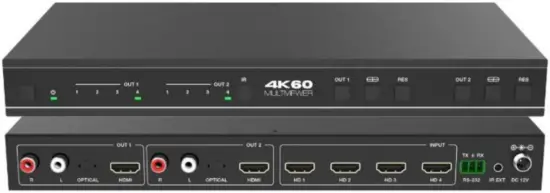 User Manual
User Manual
Version v1.0
Thank you for purchasing DVDO-Matrix-42SS-MV
For optimum performance and safety, please read these instructions carefully before connecting, operating or adjusting this product. Please keep this manual for future reference.
Surge protection device recommended
This product contains sensitive electrical components that may be damaged by electrical spikes, surges, electric shock, lighting strikes, etc. Use of surge protection systems is highly recommended in order to protect and extend the life of your equipment.
Introduction
This 4×2 Multiviewer Seamless UHD Video Matrix Switcher was developed for the purpose of supporting higher output resolution (4K@60) for multiple sources on two screens. It can accept 4 HDMI input digital sources and combine four video signals onto two HDMI UHD or HD monitors independently. The user can manage each input, and create combinations of the four inputs on two displays, as well as adjust the position of any input.
This product supports 8 display modes, within the mode range, users can freely switch 4-channel HD input signals. It can realize single screen display and multiview display on a single screen.
This product supports full range of input video resolutions up to 4K@60 (RB) and audio RCA /Optical de-embedding supported for external audio distribution systems.
This Matrix Switcher can be controlled via front panel buttons, IR remote, OSD menu navigation, Controller software, RS-232 commands.
Features
- HDMI 2.0b, HDCP 2.2 and HDCP 1.x compliant
- 18Gbps uncompressed Bandwidth, input and output resolution up to 4K2K@60 4:4:4
- HDMI audio formats support LPCM, DD+, DTS, Dolby TrueHD, DTS HD-master pass-through
- Seamless switching between input channels
- Combined multiple images independent layouts to display on two UHD TVs
- Up to 8 display modes: Single, PIP, PBP(1), PBP(2), Triple(1), Triple(2), Quad(1), Quad(2)
- Audio de-embedding via analog and optical fiber audio ports
- Control via front panel buttons, IR remote, OSD menu navigation, Controller software, RS-232 commands
- Each output port supports Scaler function
- Support independent audio selection
- Advanced EDID management
- Compact design for easy and flexible installation
Package Contents
- 1 x 4K60 4×2 Multiviewer Seamless UHD Video Matrix Switcher
- 1 x IR Remote
- 1 x 3pin-3.81mm Phoenix Connector (male)
- 1 x 38KHz IR Wideband Receiver Cable (1.5 meters)
- 2 x Mounting Ears
- 4 x Machine Screws (KM3*4)
- 1 x 12V/2.5A Locking Power Adapter
- 1 x User Manual
Specifications
| Technical | |
| HDMI Compliance | HDMI 2.0b |
| HDCP Compliance | HDCP 2.2 / 1.x |
| Video Bandwidth | 18Gbps |
| Video Resolution | Up to 4K2K@60 4:4:4 |
| IR Level | 5Vp-p |
| IR Frequency | 38KHz |
| Color Space | RGB, YCbCr 4:4:4, YCbCr 4:2:2, YCbCr 4:2:0 |
| Color Depth | 8/10/12-bit |
| Audio Formats | HDMI audio: PCM2.0/5.1/7.1CH, Dolby Digital/Plus/EX, Dolby True HD, DTS, DTS-EX, DTS-96/24, DTS High Res, DTS-HD Master Audio Analog audio [3.5mm L/R]: PCM2.0 Optical fiber audio: PCM2.0/5.1/7.1CH, Dolby Digital/plus, DTS 5.1 |
| ESD Protection | Human body model — ±8kV (Air-gap discharge) & ±4kV (Contact discharge) |
| Connection | |
| Input ports | 4 x HDMI IN [Type A, 19-pin female] |
| Output ports | 2 x HDMI OUT [Type A, 19-pin female] 2 x L/R OUTPUT [RCA] 2 x OPTICAL OUTPUT [S/PDIF] |
| Control ports | 1 x RS-232 [3pin-3.81mm phoenix connector] 1 x IR EXT [3.5mm Stereo Mini-jack] |
| Mechanical | |
| Housing | Metal Enclosure |
| Color | Black |
| Dimensions | 270mm [W] x 130mm [D] x 30mm [H] |
| Weight | 906g |
| Power Supply | Input: AC 100 – 240V 50/60Hz Output: DC 12V/2.5A (US/EU standard, CE/FCC/UL certified) |
| Power Consumption | 15.72W (Max) |
| Operating Temperature | 32 – 104°F / 0 – 40°C |
| Storage Temperature | -4 – 140°F / -20 – 60°C |
| Relative Humidity | 20 – 90% RH (no-condensing) |
Operation Controls and Functions
5.1 Front Panel

| No. | Name | Function Description |
| 1 | Power button | ▪ Short press this button to power on the device. ▪ Long press this button for 1 seconds to enter the standby mode. |
| 2 | Power LED | The Power LED will light in green when the product is powered on, and red when the product is on standby. |
| 3 | OUT 1 LEDs | Signal source indicator for the HDMI OUT 1 port. In single screen display mode, when the HDMI OUT 1 port outputs the signal from the HD 1/2/3/4 port, the corresponding green LED will be on. In multiview mode, all OUT 1 LEDs will light in green. |
| 4 | OUT 2 LEDs | Signal source indicator for the HDMI OUT 2 port. In single screen display mode, when the HDMI OUT 2 port outputs the signal from the HD 1/2/3/4 port, the corresponding green LED will be on. In multiview mode, all OUT 2 LEDs will light in green. |
| 5 | IR Window | IR signal receiving window. |
| 6 | OUT 1 button | Input source switching button for the HDMI OUT 1 port , only available in single screen display mode. |
| 7 | OUT 1 Multiview button | Multiview display mode switching button for the HDMI OUT 1 port. ▪ Short press this button to circularly select: Single-PIP-PBP(1)-PBP(2)-Triple(1)-Triple(2)-Quad(1)-Quad(2)-single. ▪ Long press this button for 3 seconds to switch the aspect ratio (16:9/Full) for PBP (1) / PBP (2) / Triple (1) / Triple (2) / Quad (1) / Quad (2). |
| 8 | OUT 1 RES button | Output resolution switching button for the HDMI OUT 1 port. ▪ Short press the RES button, the OSD will display the current output resolution of the HDMI OUT 1 port. Short press the RES button again before the OSD disappears to circularly switch the output resolution (Please refer to the output resolution list of “8.Video & Audio”). ▪ Long press the RES button for 3 seconds to switch the output resolution to 720P60. |
| 9 | OUT 2 button | Input source switching button for the HDMI OUT 2 port, only available in single screen display mode. |
| 10 | OUT 2 Multiview button | Multiview display mode switching button for the HDMI OUT 2 port. ▪ Short press this button to circularly select: Single-PIP-PBP(1)-PBP(2)-Triple(1)-Triple(2)-Quad(1)-Quad(2)-single. ▪ Long press this button for 3 seconds to switch the aspect ratio (16:9/Full) for PBP (1) / PBP (2) / Triple (1) / Triple (2) / Quad (1) / Quad (2). |
| 11 | OUT 2 RES button | Output resolution switching button for the HDMI OUT 2 port. ▪ Short press the RES button, the OSD will display the current output resolution of the HDMI OUT 2 port. Short press the RES button again before the OSD disappears to circularly switch the output resolution (Please refer to the output resolution list of “8.Video & Audio”). ▪ Long press the RES button for 3 seconds to switch the output resolution to 720P60. |
5.2 Rear Panel

| No. | Name | Function Description |
| 1 | L/R OUT 1 | PCM2.0 Analog audio output port. |
| 2 | OPTICAL OUT 1 | Optical fiber digital audio output port. |
| 3 | HDMI OUT 1 | HDMI signal output port, connected to HDMI display device such as TV or Monitor with HDMI cable. |
| 4 | L/R OUT 2 | PCM2.0 Analog audio output port. |
| 5 | OPTICAL OUT 2 | Optical fiber digital audio output port. |
| 6 | HDMI OUT 2 | HDMI signal output port, connected to HDMI display device such as TV or Monitor with HDMI cable. |
| 7 | HD 1-4 INPUT ports | HDMI signal input ports, connected to HDMI source device such as DVD or Set-top box with HDMI cable. |
| 8 | RS-232 port | 3-pin phoenix connector, connected to a PC or control system for serial port upgrade or RS-232 command control. |
| 9 | IR EXT port | IR signal receiving port, connected with 38KHz IR Receiver cable. If the IR signal receiving window of the unit is blocked or the unit is installed in a closed area out of infrared line of sight, the IR receiver cable can be inserted to the “IR EXT” port to receive the IR remote signal. |
| 10 | DC 12V | DC 12V/2.5A power input port. |
5.3 IR Pin Definition
IR Receiver pin’s definition is as below:

IR Remote
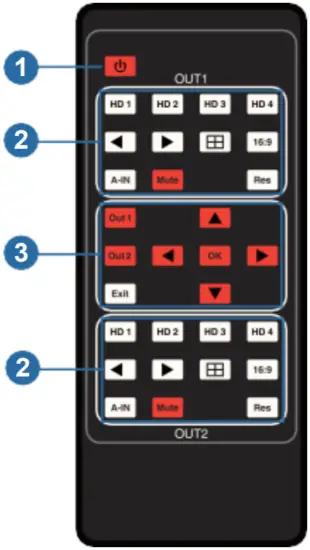
- Power button: Press this button to power on the switcher or set it to standby mode.
OUT 1/OUT 2 buttons: - HD 1/2/3/4: Press these buttons to select input source in single screen display mode, and the corresponding input LED on the front panel will light in green.
◀ ▶ : Press these buttons to circularly select the last or next input source in single screen display mode.
 : Multiview display mode switching button.
: Multiview display mode switching button.
Short press this button to circularly select: SINGLE – PIP – PBP (1) – PBP (2) – Triple (1) – Triple (2) – Quad (1) – Quad (2).
16:9: Press this button to switch the aspect ratio (16:9/Full) for PBP (1) / PBP (2) / Triple (1) / Triple (2) / Quad (1) / Quad (2) display mode.
A-IN: Press this button to pop up the audio channel selection OSD, then press the ▲/▼ button to select the audio output channel.
(The output audio follows the video source by default.)
Mute: Press this button to mute / unmute the audio.
RES: Output resolution switching button.
▪ Short press the RES button to circularly switch the output resolution of the HDMI OUT 1/2 port (Please refer to the output resolution list of “8. Video & Audio”).
▪ Long press the RES button for 3 seconds to switch the output resolution to 720P60. - Out 1: Press this button to enter the OSD menu of the HDMI OUT 1 port, and set the corresponding function by pressing ▲/▼/◀/▶/OK button.
Out 2: Press this button to enter the OSD menu of the HDMI OUT 2 port, and set the corresponding function by pressing ▲/▼/◀/▶/OK button.
Exit: Press this button to exit the OSD settings layer by layer.
EDID Settings
User can select following EDID modes via RS-232 commands or OSD menu navigation or Controller software.
| No. | EDID Mode | No. | EDID Mode |
| 1 | 4K2K60_444, Stereo Audio 2.0 | 11 | 1680×1050,Stereo Audio 2.0 |
| 2 | 4K2K60_444, Dolby/DTS 5.1 | 12 | 1600×1200,Stereo Audio 2.0 |
| 3 | 4K2K60_444, HD Audio 7.1 | 13 | 1440×900,Stereo Audio 2.0 |
| 4 | 4K2K30_444, Stereo Audio 2.0 | 14 | 1360×768, Stereo Audio 2.0 |
| 5 | 4K2K30_444, Dolby/DTS 5.1 | 15 | 1280×1024,Stereo Audio 2.0 |
| 6 | 4K2K30_444, HD Audio 7.1 | 16 | 1024×768, Stereo Audio 2.0 |
| 7 | 1080P, Stereo Audio 2.0 | 17 | 720p,Stereo Audio 2.0 |
| 8 | 1080P, Dolby/DTS 5.1 | 18 | AUTO |
| 9 | 1080P, HD Audio 7.1 | 19 | USER1 |
| 10 | 1920×1200,Stereo Audio 2.0 |
Video & Audio
The switcher supports multiple resolution video input up to 3840×2160@60, and supports multiple audio formats (PCM2.0/5.1/7.1CH, Dolby Digital/Plus/ EX, Dolby True HD, DTS, DTS-EX, DTS-96/24, DTS High Res, DTS-HD Master Audio) pass-through function via HDMI cable.
The switcher supports following video output resolutions via a powerful scaling engine.
| No. | Output Resolution | No. | Output Resolution |
| 1 | 4096x2160p 60Hz | 8 | 1920x1080p 60Hz |
| 2 | 4096x2160p 50Hz | 9 | 1920x1080p 50Hz |
| 3 | 3840x2160p 60Hz | 10 | 1360x768p 60Hz |
| 4 | 3840x2160p 50Hz | 11 | 1280x800p 60Hz |
| 5 | 3840x2160p 30Hz | 12 | 1280x720p 60Hz |
| 6 | 3840x2160p 25Hz | 13 | 1280x720p 50Hz |
| 7 | 1920x1200p 60Hz RB | 14 | 1024×768 60Hz |
Multiview
The switcher supports 8 categories of multiview display modes:
SINGLE, PIP, PBP (1), PBP (2), Triple (1), Triple (2), Quad (1), Quad (2)
Users can select different operations for different multiview modes as following:
SINGLE: Inputs selection
PIP: Inputs selection, Sub window size and position selection
PBP (1), PBP (2), Triple (1), Triple (2), Quad (1), Quad (2): Inputs selection, Display mode selection, Display aspect selection
Multiview window distributions are as following:

User can select multiview display modes via RS-232 commands or OSD menu navigation or Controller software.
- A total of eight buttons on the IR Remote are used for OSD menu navigation, including OUT 1, OUT 2, Exit,▲,▼,◀,▶,OK.
Menu contents are as follows:Output Resolution 3840x2160p60 4096x2160p 60Hz/
4096x2160p 50Hz/
3840x2160p 60Hz/
3840x2160p 50Hz/
3840x2160p 30Hz/
3840x2160p 25Hz/
1920x1200p60Hz RB/
1920x1080p 60Hz/
1920x1080p 50Hz/
1360x768p 60Hz/
1280x800p 60Hz/
1280x720p 60Hz/
1280x720p 50Hz/
1024×768 60HzVKA BLACKSCREEN BLACKSCREEN, BLUESCREEN ITC OFF ON, OFF Multiview Single Input select HDMI1,HDMI2,HDMI3,HDMI4 PIP Win1 Select HDMI1,HDMI2,HDMI3,HDMI4 Win2 Select HDMI1,HDMI2,HDMI3,HDMI4 PIP Position Right Bottom,Right Top,Left Bottom,Left Top PIP Size Small,Middle,Large PBP Win1 Select HDMI1,HDMI2,HDMI3,HDMI4 Win2 Select HDMI1,HDMI2,HDMI3,HDMI4 MODE 1, 2 Aspect Full, 16:9 3 x WIN Win1 Select HDMI1,HDMI2,HDMI3,HDMI4 Win2 Select HDMI1,HDMI2,HDMI3,HDMI4 Win3 Select HDMI1,HDMI2,HDMI3,HDMI4 MODE 1, 2 Aspect Full, 16:9 4 x WIN Win1 Select HDMI1,HDMI2,HDMI3,HDMI4 Win2 Select HDMI1,HDMI2,HDMI3,HDMI4 Win3 Select HDMI1,HDMI2,HDMI3,HDMI4 Win4 Select HDMI1,HDMI2,HDMI3,HDMI4 MODE 1, 2 Aspect Full, 16:9 AUDIO Audio Select WIN1 WIN1,HDMI1,HDMI2,HDMI3, HDMI4 AUDIO-MUTE OFF ON, OFF System Language/语言 English English, 中文 EDID 4K60-2.0 4K60-2.0,4K60-5.1CH,
4K60-7.1CH,4K30-2.0CH,
4K30-5.1CH,4K30-7.1CH,
1080P-2.0CH,1080P-5.1CH,
1080P-7.1CH,1920×1200-
2.0CH,1680×1050-2.0CH,
1600×1200-2.0CH,1440×900
-2.0CH, 1360×768-2.0CH,
1280×1024-2.0CH, 1024x
768-2.0CH,720P-2.0CH,
AUTO, USER1Baud rate 115200 115200,57600,38400, 19200,9600 Reset Reset Reset FW Version Read only - A total of two buttons on the IR Remote are used for audio setting on OSD menu navigation, including A-IN, Mute.
Menu contents are as follows:A-IN Audio Input WIN1 WIN1,HDMI1,HDMI2,HDMI3, HDMI4 Mute Audio Mute OFF ON, OFF
Controller Software Operation Guide
11.1 Installation & Connection
Follow the steps below to install the Controller software.
Step 1. Double-click the following driver to install the Controller software.
![]()
Step 2. Select “Anyone who uses this computer (all users)”, and then click “Next”.
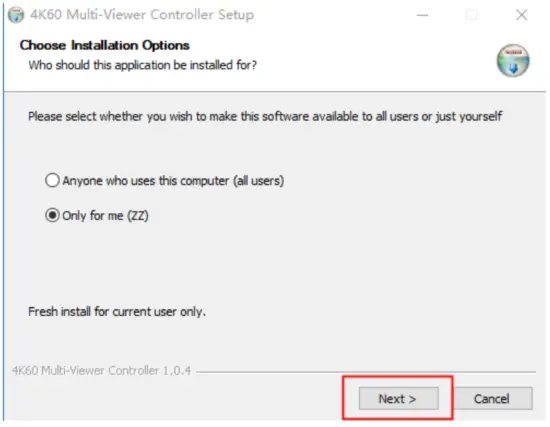
Step 3. Select the installation path and click “Install”. After the installation is completed, click “Finish” to start using the Controller software.
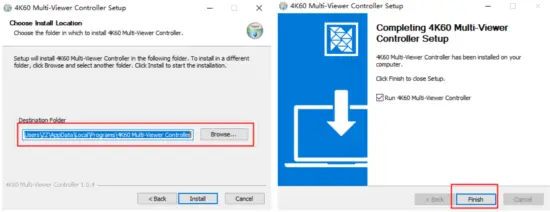
Follow the steps below to connect the Controller software and the device.
Step 1. Connect the RS-232 port of the switcher to a PC with an RS-232 serial cable and an USB to RS-232 serial cable, as shown in the figure below.

Step 2. Launch the installed Controller software. (The default language is English, and you can set the language on the upper right corner of the main page.) Select “COM Control Mode” on the “General” page, then select the Port number and Baud Rate (default: 115200), and finally click “Connect”.
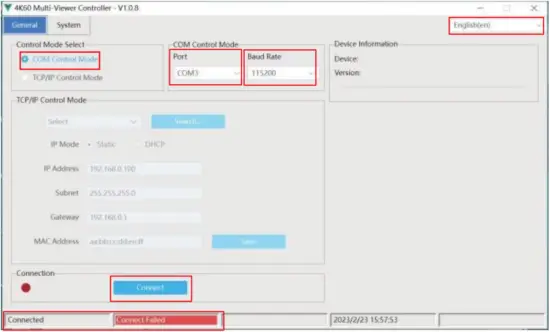
After successful connection, the “General” page will display the relevant information of the connected device, and the status bar at the bottom will display “Connected”.
11.2 Controller Main Interface
■ General Page

You can do the following operations on the General page:
- Control Mode Select: Select the “COM Control Mode”. (TCP/IP control is not supported temporarily, so the TCP/IP Control Mode is disabled.)
- COM Control Mode: Select the Port number and Baud Rate of the device.
- Device Information: Display the device name, version and input/output connection status. Click “Device Status” to refresh the device status.
- Connection: Click to set the connection status.
- Connected: Display the connection status.
■ Output Page
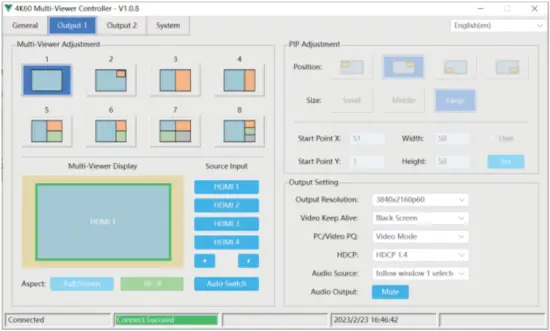
You can do the following operations on the Output page:
- Multi-View Adjustment: Click to select the desired screen display mode.
There are eight modes available: SINGLE-PIP-PBP(1)-PBP(2)-Triple(1)- Triple(2)-Quad(1)-Quad(2). - PIP Adjustment: In the PIP mode, you can switch the location and size of the PIP and set the user-defined PIP, as shown in the following table.
Size Relative Position (Starting Position) Height and Width of the Inner Frame Small Start Point X: 71
Start Point Y: 71Width: 30
Height: 30Middle Start Point X: 61
Start Point Y: 61Width: 40
Height: 40Large Start Point X: 51
Start Point Y: 51Width: 50
Height: 50User Start Point X: 1-100
Start Point Y: 1-100Width: 1-100
Height: 1-100 - Multi-Viewer Display: Display the input and output.
- Source Input: Select the input signal source. You should select the window in “Multi-Viewer Display” firstly, and then click “HDMI 1/2/3/4” in “Source Input” to select a signal source, or click ◀/▶ to select the last/ next signal source.
- Aspect: Click “Full Screen” or “16:9” to switch the display aspect. Only the following modes are available: PBP(1)-PBP(2)-Triple(1)-Triple(2) -Quad(2).
- Auto Switch: Enable or disable the function of automatically switching input signal source, available only in SINGLE mode.
- Output Setting: Set the output resolution, video keep alive, PC/Video PQ, HDCP, audio source and audio output.
■ System Page
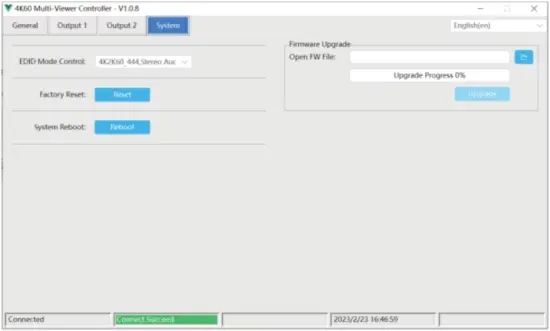
You can do the following operations on the System page:
- EDID Mode Control: Click the drop-down list on the right to select EDID mode.
- Firmware Upgrade: Click the folder icon on the right to import the firmware upgrade file, then click “Upgrade” to start upgrade. There will be a progress bar prompt during the upgrade process. When the progress bar reaches 100%, it indicates the upgrade is successful, and the device will be restarted automatically.
- Factory Reset: Click “Reset” to reset the device to factory default settings.
- System Reboot: Click “Reboot” to reboot the device.
RS-232 Command
The product also supports RS-232 command control. Connect the RS-232 port of the product to a PC with a 3-pin phoenix connector cable. Then open a Serial Command tool on PC to send ASCII commands to control the product. The ASCII command list about the product is shown as below.
| ASCII Commands | ||||
| Serial port protocol: baud rate: 115200(default) Data bits: 8 Stop bits: 1 Check bit: 0 | ||||
| x – Parameter 1; y – Parameter 2; ! – Delimiter | ||||
| Command Code | Function Description | Example | Feedback | Default |
| System Setting | ||||
| help! | List all commands | help! | ||
| r type! | Get device model | r type! | 4×2 HDMI Multiviewer | |
| r fw version! | Get Firmware version | r fw version! | MCU FW version x.xx.xx SCALER FW version x.xx.xx |
|
| power z! | Power on/off the device,z=0~1 (z=0 power off, z=1 power on) | power 1! | Power on System Initializing… Initialization Finished! MCU FW version x.xx.xx SCALER FW version x.xx.xx |
|
| r power! | Get current power state | r power! | power on/power off | |
| reboot! | Reboot the device | reboot! | Reboot… System Initializing… Initialization Finished! MCU FW version x.xx.xx SCALER FW version x.xx.xx |
|
| reset! | Reset to factory defaults | reset! | Reset to factory defaults System Initializing… Initialization Finished! MCU FW version x.xx.xx SCALER FW version x.xx.xx |
|
| Command Code | Function Description | Example | Feedback | Default |
| Output Setting | ||||
| s output y res x! | Set Output y Resolution (y=1~2, x=1~14) y=1. output 1 y=2. output 2 1. 4096x2160p60, 2. 4096x2160p50, 3. 3840x2160p60, 4. 3840x2160p50, 5. 3840x2160p30, 6. 3840x2160p25, 7. 1920x1200p60RB, 8. 1920x1080p60, 9. 1920x1080p50, 10.1360x768p60, 11.1280x800p60, 12.1280x720p60, 13.1280x720p50, 14. 1024x768p60, |
s output 1 res 3! | output 1 resolution: 3840x2160p60 | 3840x2160p 60 |
| r output y res! | Get output y resolution (y=1~2) 1. output 1 2. output 2 |
r output res! | output 1 resolution: 3840x2160p60 | |
| s output hdcp x! | set output hdcp (y=1~2, x=1~3) y=1. output 1 y=2. output 2 x=1. HDCP 1.4 x=2. HDCP 2.2 x=3. HDCP OFF |
s output 1 hdcp 2! | output 1 HDCP: HDCP 1.4 | HDCP 1.4 |
| r output y hdcp! | Get output y hdcp status. (y=1~2) 1. output 1 2. output 2 |
r output 1 hdcp! | output 1 HDCP: HDCP 1.4 | |
| s output y vka x! | Set output video keep active pattern. (y=1~2, x=1~2) y=1. output 1 y=2. output 2 x=1. black screen x=2. blue screen | s output 1 vka 1! | output 1 VKA pattern: black screen | black screen |
| r output y vka! | Get output y video keep active pattern. (y=1~2) 1. output 1 2. output 2 |
r output 1 vka! | output 1 VKA pattern: black screen | |
| s output y itc x! | Set output video mode (y=1~2, x=1~2) y=1. output 1 y=2. output 2 x=1: video mode x=2: pc mode |
s output 1 itc 1! | output 1 ITC: video mode | video mode |
| r output y itc! | Get output video mode (y=1~2) 1. output 1 2. output 2 |
r output 1 itc! | output 1 ITC: video mode |
| Command Code | Function Description | Example | Feedback | Default |
| EDID Setting | ||||
| s input EDID x! | Set HDMI input EDID mode (x=1~19) 1. 4K2K60_444,Stereo Audio 2.0 2. 4K2K60_444,Dolby/DTS 5.1 3. 4K2K60_444,HD Audio 7.1 4. 4K2K30_444,Stereo Audio 2.0 5. 4K2K30_444,Dolby/DTS 5.1 6. 4K2K30_444,HD Audio 7.1 7. 1080P,Stereo Audio 2.0 8. 1080P,Dolby/DTS 5.1 9. 1080P,HD Audio 7.1 10.1920×1200,Stereo Audio 2.0 11.1680×1050,Stereo Audio 2.0 12.1600×1200,Stereo Audio 2.0 13.1440×900,Stereo Audio 2.0 14.1360×768, Stereo Audio 2.0 15.1280×1024,Stereo Audio 2.0 16.1024×768, Stereo Audio 2.0 17.720p,Stereo Audio 2.0 18.AUTO 19. USER1 |
s input EDID 1! | input EDID:4K2K 60_444,
Stereo Audio 2.0 |
4K2K60_ 444,Stereo Audio 2.0 |
| r input EDID! | Get input EDID mode | r input EDID! | input EDID:4K2K 60_444, Stereo Audio 2.0 | |
| s edid user1 00 FF FF …! | Set user1 EDID data | s edid user1 00 FF FF FF FF …! | user1 EDID data: 00 FF FF …. | |
| r edid user1! | Get user1 EDID data | r edid user1! | user1 EDID data: 00 FF FF FF FF FF FF 00 ……… | |
| Audio Setting | ||||
| s output y audio x! | Set output y audio source (y=1~2, x=0~4) y=1. output 1 y=2. output 2 x=0. follow window 1 selected source x=1. HDMI 1 input audio x=2. HDMI 2 input audio x=3. HDMI 3 input audio x=4. HDMI 4 input audio |
s output 1 audio 0! | output 1 audio follow window 1 video source | output audio: follow window 1 selected source |
| r output y audio! | Get output y audio source (y=1~2) 1. output 1 2. output 2 |
r output 1 audio! | output 1 audio follow window 1 video source | |
| s output y audio mute x! | Set output audio mute on/off (x=0~1, y=1~2) y=1. output 1 y=2. output 2 x=0. mute off x=1. mute on |
s output 1 audio mute 0! | output 1 audio mute off | off |
| Command Code | Function Description | Example | Feedback | Default |
| r output y audio mute! | Get output y audio mute on/off (y=1~2) 1. output 1 2. output 2 |
r output 1 audio mute! | output 1 audio mute off | |
| Single Screen Mode Setting | ||||
| s output y auto switch x! | Enable/disable auto switch feature (y=1~2,x=0~1) y=1. output 1 y=2. output 2 0. Disable auto switch 1. Enable auto switch |
s output 1 auto switch 0! | output 1 auto switch off | auto switch off |
| r output y auto switch! | Get output y auto switch feature (y=1~2) 1. output 1 2. output 2 |
r output 1 auto switch! | output 1 auto switch off | |
| s output y in source x! | Route input source to output y (y=1~2, x=1~4) y=1. output 1 y=2. output 2 x=1. HDMI 1 x=2. HDMI 2 x=3. HDMI 3 x=4. HDMI 4 |
s output 1 in source 1! | output 1 in source: HDMI 1 | HDMI 1 |
| r output y in source! | Get output y selected input source (y=1~2) 1. output 1 2. output 2 |
r output 1 in source! | output 1 in source: HDMI 1 | |
| Multi-viewer Mode Setting | ||||
| s output y multiview x! | Set output y multi-viewer display mode (y=1~2, x=1~5) y=1. output 1 y=2. output 2 x=1. single screen x=2. PIP x=3. PBP x=4. triple screen x=5. quad screen |
s output 1 multiview 1! |
output 1 multiview: single screen | single screen |
| r output y multiview! | Get output y multi-viewer display mode (y=1~2) 1. output 1 2. output 2 |
r output 1 multiview! | output 1 multiview: single screen | |
| Command Code | Function Description | Example | Feedback | Default |
| s output z window x in y! | Select output z one input for one display window for the current Multiview mode. (z=1~2) 1. output 1 2. output 2 (x=1~4) 1. window 1 2. window 2 3. window 3 4. window 4 (y=1~4) 1. HDMI 1 2. HDMI 2 3. HDMI 3 4. HDMI 4 |
s output 1 window 1 in 1! |
output 1: window 1 select HDMI 1 | |
| r output y window x in! | Get output y windows selected input source (y=1~2) 1. output 1 2. output 2 (x=0~4) 0. ALL 1. window 1 2. window 2 3. window 3 4. window 4 |
r output 1 window 1 in! | output 1 window 1 select HDMI 1 | |
| s output z window x border y! | Set the border mode of the specified window. (z=1~2) 1. output 1 2. output 2 (x=1~4) 1. window 1 2. window 2 3. window 3 4. window 4 (y=0~1) 0. off 1. on |
s output 1 window 1 border 1! |
output 1 window 1 border on | off |
| r output y window x border! | Get the border mode of windows (y=1~2) 1. output 1 2. output 2 (x=0~4) 0. ALL 1. window 1 2. window 2 3. window 3 4. window 4 |
r output 1 window 1 border! | output 1 window 1 border on |
| Command Code | Function Description | Example | Feedback | Default |
| s output z window x border color y! | Set the border color of the specified window. (z=1~2) 1. output 1 2. output 2 (x=1~4) 1. window 1 2. window 2 3. window 3 4. window 4 (y=1~9) 1. BLACK 2. RED 3. GREEN 4. BLUE 5. YELLOW 6. MEGENTA 7. CYNA 8. WHITE 9. GRAY |
s output 1 window 1 border color 1! |
output 1 window 1 border color: BLACK | YELLOW |
| r output y window x border color! | Get the border color of windows (y=1~2) 1. output 1 2. output 2 (x=0~4) 0. ALL 1. window 1 2. window 2 3. window 3 4. window 4 |
r output 1 window 1 border color! |
output 1 window 1 border color: BLACK | |
| s output y PIP Hstart Vstart Hsize Vsize! | Set PIP window to user define mode (y=1~2) 1. output 1 2. output 2 Hstart=(1~100) Vstart=(1~100) Hsize=(1~100) Vsize=(1~100) NOTE:Hstart+Hsize<=101, Vstart+Vsize<=101 |
s output 1 PIP 10 10 20 20! | output 1 PIP 10 10 20 20 | |
| s output y PIP position x! | Set output y PIP window position (y=1~2) 1. output 1 2. output 2 (x=1~5) 1. Left Top 2. Left Bottom 3. Right Top 4. Right Bottom 5. user |
s output 1 PIP position 3! | output 1 PIP on right top | PIP on right top |
| Command Code | Function Description | Example | Feedback | Default |
|
r output y PIP position! |
Get output y PIP window position (y=1~2) 1. output 1 2. output 2 |
r output 1 PIP position! | output 1 PIP on right top | |
| s output y PIP size x! | Get output y PIP window size (y=1~2) 1. output 1 2. output 2 (x=1~4) 1. small 2. middle 3. large 4. user |
s output 1 PIP size 3! | output 1 PIP size large | PIP size: large |
| r output y PIP size! | Get output y PIP window size (y=1~2) 1. output 1 2. output 2 |
r output 1 PIP size! | output 1 PIP size large | |
| s output y PBP mode x! | Set output y PBP windows display mode (y=1~2) 1. output 1 2. output 2 (x=1~2) 1. PBP mode 1 2. PBP mode 2 |
s output 1 PBP mode 1! | output 1 PBP mode 1 | PBP mode 1 |
| r output y PBP mode! | Get output y PBP windows display mode (y=1~2) 1. output 1 2. output 2 |
r output 1 PBP mode! | output 1 PBP mode 1 | |
| s output y PBP aspect x! | Set output y PBP windows display aspect ratio (y=1~2) 1. output 1 2. output 2 (x=1~2) 1. Full screen 2. 16:9 |
s output 1 PBP aspect 1! | output 1 PBP aspect full screen | PBP aspect: full screen |
| r output y PBP aspect! | Get output y PBP windows display aspect ratio (y=1~2) 1. output 1 2. output 2 |
r output 1 PBP aspect! | output 1 PBP aspect full screen | |
| s output y triple mode x! | Set output y triple windows display mode (y=1~2) 1. output 1 2. output 2 (x=1~2) 1. triple mode 1 2. triple mode 2 |
s output 1 triple mode 1! | output 1 triple mode 1 | triple mode 1 |
| Command Code | Function Description | Example | Feedback | Default |
| r output y triple mode! | Get output y triple windows display mode (y=1~2) 1. output 1 2. output 2 |
r output 1 triplemode! |
output 1 triple mode 1 |
|
| s output y triple aspect x! | Set output y triple windows display aspect ratio (y=1~2) 1. output 1 2. output 2 (x=1~2) 1. Full screen 2. 16:9 |
s output 1 triple aspect 1! | output 1 triple aspect full screen | triple aspect: full screen |
| r output y triple aspect! | Get output y triple windows display aspect ratio (y=1~2) 1. output 1 2. output 2 |
r output 1 triple aspect! | output 1 triple aspect full screen | |
| s output y quad mode x! | Set output y quad windows display mode (y=1~2) 1. output 1 2. output 2 (x=1~2) 1. quad mode 1 2. quad mode 2 |
s output 1 quad mode 1! | output1 quad mode 1 | quad mode 1 |
| r output y quad mode! | Get output y quad windows display mode (y=1~2) 1. output 1 2. output 2 |
r output 1 quad mode! | output1 quad mode 1 | |
| s output y quad aspect x! | Set output y quad windows display aspect ratio (y=1~2) 1. output 1 2. output 2 (x=1~2) 1. Full screen 2. 16:9 |
s output 1 quad aspect 1! | output 1 quad aspect full screen | quad aspect full screen |
| r output y quad aspect! | Get output y quad windows display aspect ratio (y=1~2) 1. output 1 2. output 2 |
r output 1 quad aspect! | output 1 quad aspect full screen |
Application Example
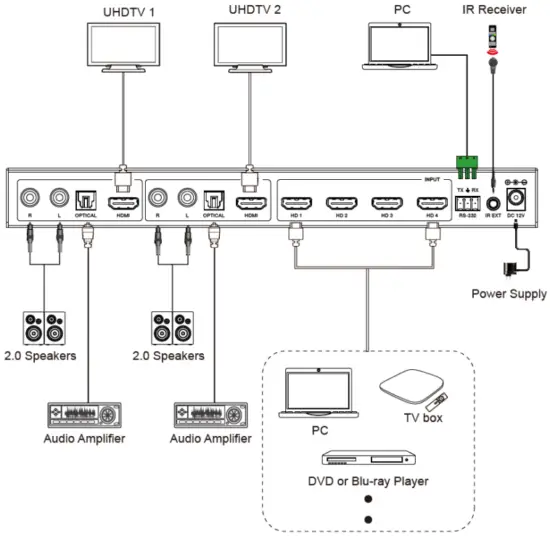
 Follow us
Follow us![]() DVDO
DVDO
+1.408.213.6680
support@dvdo.com
www.dvdo.com
Documents / Resources
 |
DVDO Matrix-42SS-MV 4K 4x2 Seamless HDMI Matrix Switcher with Multiview [pdf] User Manual Matrix-42SS-MV, Matrix-42SS-MV 4K 4x2 Seamless HDMI Matrix Switcher with Multiview, 4K 4x2 Seamless HDMI Matrix Switcher with Multiview, Seamless HDMI Matrix Switcher with Multiview, HDMI Matrix Switcher with Multiview, Matrix Switcher with Multiview, Switcher with Multiview, Multiview |



